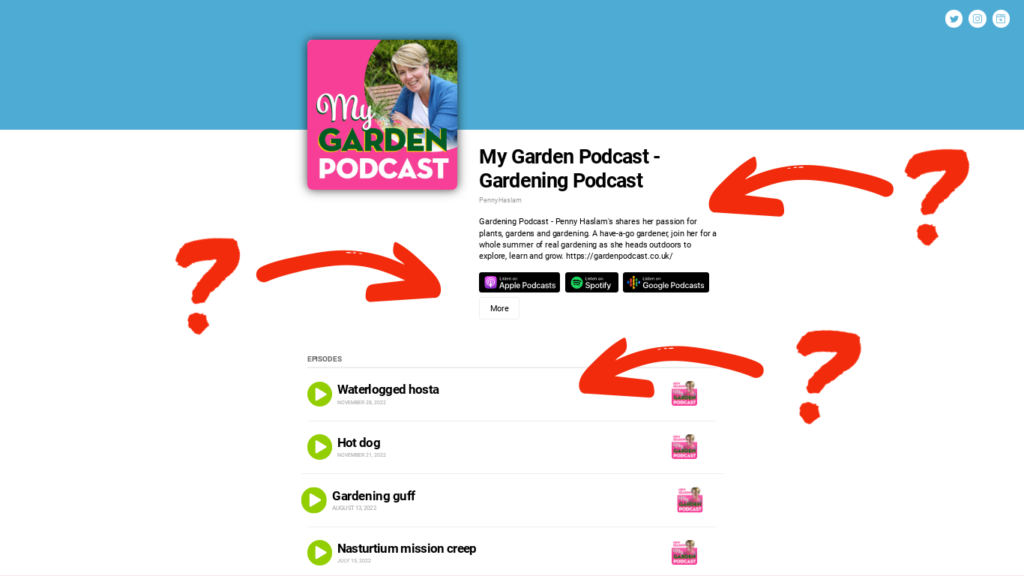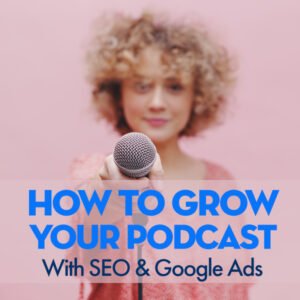Why the website provided by podcast hosts isn't great at delivering listeners because of poor SEO.
One of the podcasts I produce is called My Garden Podcast. Gardening may not be your thing, but I'll use this as an example to show you why the free website provided by most podcast hosts isn't ideal for building your audience. We'll get onto building better websites later, but this is a good starting point to understand SEO.

You'll note the image of the homepage above has some arrows and question marks highlighting my issues with this page:
There isn't enough text on this page to let Google understand what it's about
Having a lot of well-written and relevant text on a webpage is important for several reasons. First, it helps search engines understand the content and purpose of the page, which can help improve its ranking in search results. Second, having sufficient text allows the webpage to use relevant keywords and phrases, which are also important for good search engine ranking. Finally, pages with little text are often not very useful to users, and as a result, may be ranked poorly by search engines like Google.
The list of episode titles has no supporting text
Search engines rely on the content of a webpage to understand its topic and purpose. If a webpage has a titles but no supporting text, it can be difficult for the search engine to understand what the page is about and how it might be relevant to a user's search. This will make it harder for the page to rank well in search results.
How much text should a webpage have?
There is no specific amount of text that a webpage should have in order to rank well in search results and Google doesn't give a specific word count. In general, it's important to have enough text to effectively communicate the content and purpose of the page to both search engines and users.
Users are offered the chance to leave immediately
This isn't so much an SEO issue but it is a useability one. The top of the page is plastered with links away from the site to Apple Podcasts, Spotify and Google podcasts. These links are well-meaning in that they are encouraging people to listen to the show via a podcast app. However, It's worth noting lots of podcast listeners don't have or want to use these apps. I've removed all such links from my podcast websites and seen listenership increase. That's because offering users the chance to listen to your show on Spotify or any other podcast player is just sending them away to a place where they can browse other content.
If you are building a dedicated podcast website, switch off your free podcast host site to avoid competing with yourself
Thankfully most podcast hosts give you the option to effectively switch off the podcast website they provide for you. In your host settings, you should have a button to engage a "no follow" instruction for search engines. Do this once your optimised self-built site is up and running.
Building your own podcast website
Building a website for your podcast may sound daunting, but it's not complicated and doesn't require coding skills. In this post, I'll outline three great options for you to explore.
I'm sorry, there isn't room in this guide to provide website-building tutorials (yet). However, there is a lot of detailed advice online to help you set up a site. Here are some of the most popular options:
WordPress, Wix, and Squarespace are all platforms that allow users to create and manage websites without needing coding or design skills. However, they differ in their features, pricing, and target audience.
WordPress
WordPress is an open-source platform widely used for building websites, blogs, and e-commerce stores. More than 40% of all websites run on WordPress, including my own.
It is highly customisable and has a large community of developers who contribute to the platform with a wide range of designs (called themes) and customisable tools and integrations (called plugins).
I use a web host called Hostinger. Like many hosts, you can purchase a domain name and use the one-click install feature for WordPress. Choose a theme from the thousands of free ones available online and start populating your site with podcast episodes and transcripts.
Wix
Wix is a cloud-based website builder that is designed for users with little or no coding experience. It offers a range of templates and drag-and-drop tools that make it easy to create a professional-looking website quickly. Wix is an easy-to-use platform for building a website.
Squarespace
Squarespace is another cloud-based website builder that is designed for users who want a professional-looking website without the need for coding skills. It offers a range of templates and design tools that make it easy to create a visually appealing website.
Overall, WordPress is a more flexible and customisable platform, suitable for users who want to create more complex websites, while Wix and Squarespace are more suitable for users who want to create a simple, professional-looking website quickly and easily.
Whichever platform you use, remember to choose a theme (or look) that provides the option to:
- Include lots of text
- Embed your podcast so people can listen on your page, (all the above do this.)

Introduction: How to grow your podcast
Get started with podcast SEO
Using Keywords to improve podcast website SEO
- Google Ads tutorial - Discover keywords for your podcast
- Answer the Public tutorial - Is your podcast answering people's questions
- Put your podcast keywords to work
Get to grips with podcast transcriptions
- Why should I use podcast transcriptions
- Software to transcribe your podcast - Coming soon